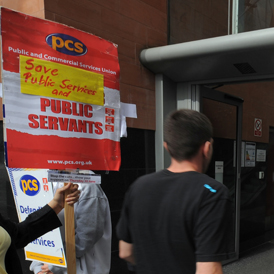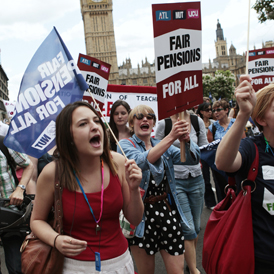How will the strikes affect you?
On Wednesday, Britain is facing its biggest public sector strike for decades, hitting schools, hospitals and airports. Channel 4 News finds out which services are likely to be affected.

The 30 November strike is set to be significantly larger than the industrial action which caused disruption in June.
The TUC estimates that up to two million public sector employees will refuse to work, affecting a wide variety of services across the country. However, the government has said it is confident it will be able to minimise the effects of the action.
The TUC told Channel 4 News it does not expect all of its 2.6 million members to take action. Despite some low turnouts in strike ballots, unions maintain that support for industrial action is high.
However serious the strike, and however good the preparation, major disruption remains likely. Teachers, border staff, civil servants, council workers and NHS staff, among other public sector workers, will all strike.
Even unions which did not strike in the last round of walkouts – including Unison and the ISU, which represents border civil servants – will take part this time round.
Schools
Major teaching unions the National Union of Teachers (NUT), the National Association of Head Teachers (NAHT) and the NASUWT will strike, meaning a significant number of schools will be closed.
The NAHT told Channel 4 News it thinks it will be “very difficult” for the vast majority of primary schools to stay open and some secondaries “will struggle”.
A spokeswoman said: “School leaders, in consultation with their boards of governors, will conduct a risk assessment on each school.
“One of the factors involved in that risk assessment will be how many members of trained staff are available to supervise pupils. Clearly primary schools are more vulnerable to closures as the number of staff required to supervise younger children is greater.
“In addition, strikers are not required to give notice of their intentions in advance so while our members are able to ask their staff what their plans are, the staff are not obliged to answer. Equally, head teachers do not have to notify their employers.”
The fact that workers have no obligation to tell their employers if they plan to strike makes it difficult to estimate what the actual turnout will be for the action.
How the strikes could affect council services around the UK
Glasgow: All council-run nurseries, schools and early-years centres will be closed to pupils, reopening on 1 December. Residential care homes for children or older people will be open but day centres for older people and those with disabilities will be closed. There will be a public holiday service for home care, meaning a reduced number of visits. Refuse collections likely to be disrupted but people should leave out bins as normal.
Newcastle-upon-Tyne: A number of both secondary and primary schools will close (more information on Newcastle City Council’s website). All libraries except the City Library will be closed for the day. The Grainger Marker will be closed. Residents expecting refuse collections on the day will have to wait a further week for their bins to be emptied. A number of Sure Start centres will shut.
Leeds: The council told Channel 4 News a number of adult care centres will be shut as well as some branches of the Learning Disabilities Fulfilling Lives Service. Leeds said many council offices, public facilities and services will close or have only minimum numbers of staff working on that day. It said it is focusing its efforts on minimising the impact on the most crucial services and most vulnerable residents. It said 159 schools are closed to pupils with a further 29 partially closed. There are more updates on the Leeds City Council website.
Cardiff: Cardiff Council told us 21 secondary and 97 primary schools will be closed, along with seven special schools and two nurseries.
Cornwall: The council says a number of “life and limb” services will remain open such as mental health social centres (working on emergency rotas) and crisis support centres. The council says there will possibly be a library service albeit with a skeleton staff. There may be disruption to refuse collection services. 62 primary and secondary schools will be either fully or partially closed, there is more information on Cornwall Council’s website.
Travel
There is likely to be disruption to air and ferry travel as well as the Channel Tunnel as border staff strike.
Heathrow operator BAA told Channel 4 News it is expecting 12-hour delays from 7am onwards though it is suggesting where possible that passengers take advantage of some airlines’ offers to change their flights and not to travel on Wednesday.

Ordinarily, Heathrow airport handles up to 180,000 passengers per day but it has asked carriers to try and reduce the number of passengers by 50 per cent.
Although the action will primarily affect arrivals, there may be a knock on effect to departures. The severity of disruption may be mitigated by people simply choosing to make alternative arrangements.
Benefits
The Public and Commercial Services union told Channel 4 News its members work across a wide variety of services including at the Ministry of Defence and in the courts service.
It said it hoped that all 250,000 of its balloted members will join in the day of action and it warned there could be disruption to services provided by HMRC, the prisons service, 999 call handling and to coastguard services.
The union also said that processing of benefit claims and payments may be disrupted and the action could impact on call-centre staff dealing with benefit enquiries and requests for crisis loans.
A clearer picture of the scale of the disruption is expected to emerge after the weekend.
Health
The National Health Service will also be affected. The Department of Health estimates that up to one in five NHS workers could strike.
Elective surgeries in some areas are likely to be cancelled however services have contingency plans to run in a similar basis to bank holidays, prioritising treatments such as chemotherapy and emergency events on the day.
A spat has blown up between Health Secretary Andrew Lansley and Unite over the impact of the strikes on the NHS, with the union saying Mr Lansley was “scaremongering” with his warnings that health workers should “consider carefully whether going on strike is the right thing to do.”
He added: “We have to put patients first.”